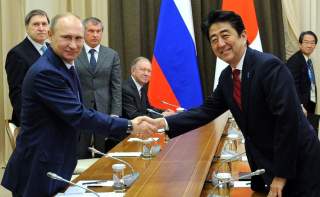Why Abe Is Seeking a Settlement with Russia
In Asia's unstable regional context, it makes more strategic sense than at any time for Japan to forge a peace treaty with Russia.
Vladimir Putin is slated to visit Japan on December 15 and 16. He will arrive at a small airport on the western edge of Japan's main island and stay at a traditional onsen (hot spring) inn located in the hometown of Prime Minister Shinzo Abe. There, Messrs. Putin and Abe will hold an unusual tête-à-tête — one between two middle-aged, naked men, bathing in the warm waters of Nagato city.
The ultimate goal of the prime minister is to forge, at long last, a bilateral peace treaty formally ending World War II, something that has eluded the two sides due to a dispute over the sovereignty of four islands north of Japan that the Red Army seized two weeks after the war ended. The task is formidable, but if the two leaders can resolve the territorial dispute, the path to a peace treaty will be cleared.
Were this a sumo match, this would be the first time since Mr. Putin returned to power that Tokyo had a wrestler both heavy enough and sufficiently resolved to fight Moscow. A Japanese premier in office only for a year or two would never be able to enter the ring. Shinzo Abe has accrued political muscle over nearly four years in office and is the most important new factor in helping to break the long stalemate between the two sides.
The second new factor is that Shinzo Abe has incentivized Vladimir Putin to enter the ring. Based on the Russian President's most recent annual “state of the union” address to the Russian parliament, Tokyo developed an eight-point plan for promoting bilateral cooperation.
At the top of the list are proposals to help improve Russia's health care and its urban infrastructure—areas that Mr. Putin often talks about because they are such a major concern to ordinary Russians. Mr. Putin made it known to the Russian public that he is greatly appreciative of the Japanese proposal, as it is salable in Russia's domestic context. They are also areas in which Japan’s private sector is interested in investing and helping design and develop.
The third new factor contributing to possible bilateral progress is the narrowed strategic space that Japan now has. Never before in Japan's modern history has she been sandwiched between the “bear” to the north and the “dragon” to the south when both countries were powerful at the same time. Both nuclear powers, the former remains keen on rebuilding its military prowess while the latter seeks to expand its maritime dominance at a pace hitherto unseen. Moreover, North Korea, another nuclear power, continues to ratchet up tensions in Northeast Asia by testing its nuclear weapons and the missiles that could deliver them. In this unstable regional context, it makes more strategic sense than at any time for Japan to forge a peace treaty with Russia.
The ring has thus been set. Messrs. Putin and Abe will have their longest engagement ever on December 15, and it will attract attention from around the world.
Yet Prime Minister Abe faces a greater challenge than President Putin. Brexit, a weakened Europe, the political vacuum unavoidable in the United States as it goes through its presidential transition, the calmer commodity markets and the Russian fait accompli in Crimea and Syria, all work in Vladimir Putin’s favor.
Shinzo Abe, by comparison, must strike a delicate balance between his unwavering support for a rules-based international order and the task of convincing the West's “public enemy number one” how important it is for Russia to work with Japan.
What are the indications, if any, that this time chances of a positive outcome are greater than before? First, it was Mr. Putin himself who initiated the dialogue with Mr. Abe. Second, the two leaders have already met fifteen times—with almost as many tête-à-têtes—in less than four years, indicating that Mr. Putin views Mr. Abe as a formidable counterpart. Third, and most important, Prime Minister Abe takes a realistic rather than optimistic view of the whole process and the actual chance of success.
Shinzo Abe began his political career in the early 1980s as a secretary to his father, then-Foreign Minister Shintaro Abe. Later in the decade, Mikhail Gorbachev made numerous overtures to the West, leading Foreign Minister Abe to believe that Japan’s long-held dream of getting back the four islands might be possible. As a result, the elder Abe devoted himself wholeheartedly to reaching an agreement with Moscow.
A young Shinzo Abe bore witness to his father’s fervent efforts: even after Shintaro Abe’s health deteriorated seriously and he was confined to a hospital, he put on a padded jacket to conceal his extreme weight loss and rose from his bed to meet the visiting Russian leader. That was Shintaro Abe's last public appearance before his death; his determination to reach an agreement with the Soviets proved fruitless.
In the thirty years since witnessing that encounter, Shinzo Abe has arguably become Japan's most seasoned diplomat on Japan-Russia relations. As such, he is fully aware that the likelihood of concluding a final deal with Mr. Putin on December 15 is highly remote. Yet, it is that very awareness that has propelled Mr. Abe to seek a settlement of this interminable problem. “If not us, who? If not now, when?” must be the questions the prime minister asks himself each day.
A sumo metaphor does not apply here since final resolution will likely take a long time. Yet Shinzo Abe knows that his summit with Vladimir Putin will determine whether that period can be abbreviated.
Tomohiko Taniguchi is Distinguished Non-Resident Fellow, Sasakawa USA, and Special Advisor to Prime Minister Shinzo Abe's Cabinet. Daniel Bob is Senior Fellow and Director of Programs at Sasakawa USA.
Image: Vladimir Putin with Shinzo Abe in 2014. Kremlin.ru

